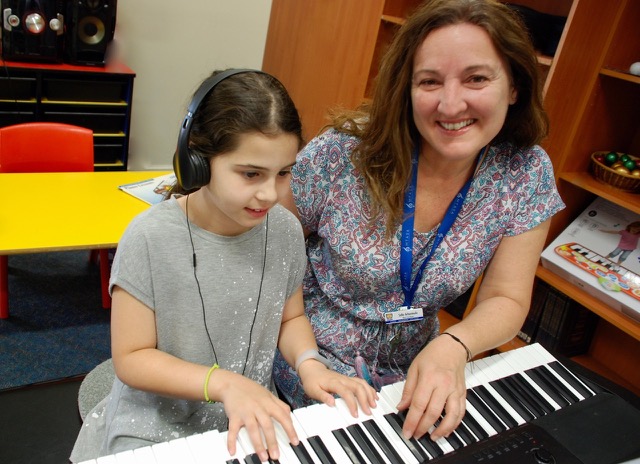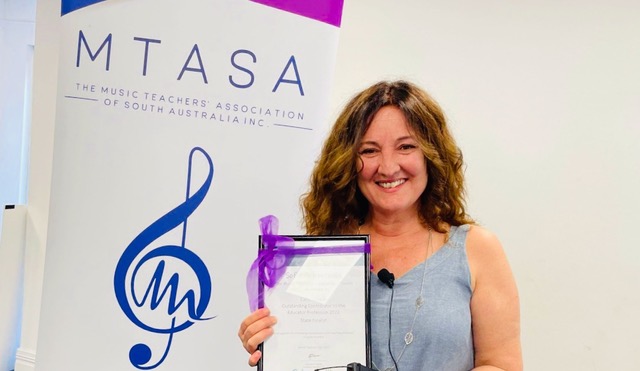This time PianoMe caught up with Sofie to talk about why she became a music educator and also about her current initiatives. She also told us why she likes PianoMe’s idea.
PianoMe (PM): Dear Sofie, thank you very much for your time! It is a great pleasure for us that you are ready for an interview with PianoMe!
Sofie Arhontoulis (SA): Thank you so much, it is my pleasure, and I am excited to talk about all things music education!
PM: That’s great, thank you! First of all, we would like to briefly introduce you to our readers, even though many of them probably already know who you are. You have over 30 years of professional experience in the teaching and performing industry, performing live and as a studio musician. For the last four years you have been representing the Music Teachers‘ Association of SA Inc. as a President of this Association.
SA: Yes, that’s right. Since 2007, when I was suddenly widowed at 37 years old, I have raised my four children alone, so it has been a very busy time for me. At the time they were 5, 3 and 1, and I was pregnant with the fourth child. I am also an Examiner for our examining body, the AMEB (Australian Music Examinations Board – editorial), and an active folk musician, arranger, orchestrator, and conductor of Greek community performances here in Adelaide. I am Chair of the Subcommittee of MERSA, (Music Education Round Table – editorial), a state body of leaders in the music sector here in South Australia. I am also a classroom music specialist teacher and choir master at a local school, Saint Spyridon College. Somehow, I manage to fit piano teaching in amongst all of this!
PM: That sounds great! Can you please tell us first how you got started playing the piano and also what motivated you to start to teach the piano?
SA: I started quite late in life. At age 15, I had my very first piano lesson, after a teacher at school asked the class if anyone would be interested to “try it out”. After a few lessons, the teacher called my parents and urged them to buy me a piano and send me to private lessons after school. It was a fast trajectory, because within two years I completed my AMEB Grade 4, then Grade 6 exam, and successfully auditioned for the Elder Conservatorium of Music at Adelaide University, and began my Bachelor of Music degree.
PM: Very interesting! From your years of teaching piano, what is the main difficulty students have while learning the piano? How do you help them to overcome it?
SA: Reading music! Interestingly, this is the topic of our MTASA Summer Professional Learning Day in January. My greatest hurdle was to read music fluently, as I was a late beginner. My aural abilities were excellent, as they came naturally to me, but reading music was an enormous struggle. I notice that students who are given sight reading regularly benefit most, as it gives them freedom and independence to play with fluency.
PM: As an experienced piano teacher, what would you consider the three most important traits of a good piano teacher?
SA: I believe that it is crucial to inspire your students. When a teacher is passionate about this craft, it transmits to the student. Consistency is also important, and students progress best with regular lessons. Lastly, having a warm and friendly demeanor goes a long way!
PM: You founded Saili Music in 2018. In what ways is your school different from other music schools?
SA: Saili Music is different in that we offer something unique; group piano sessions, with small numbers of students, 4 as the maximum. We use pedagogy outcomes and 21st century learning about creativity, collaboration, communication, critical thinking, the 4 cs and their value. Students perform regularly and the classes are fun and interesting for beginners. They are encouraged to become independent readers and learners and therefore they progress faster.

PM: Interesting! When teaching a group class, how do you keep students engaged?
SA: Students are engaged because they are inspired to see others progress, which you don’t get to see with individual lessons, and they grow confident in performance, also we include music games to make it super fun! Students progress faster (friendly competition), have more fun (increased personal joy), and develop more independence (positive peer pressure to succeed) in these group lessons.
PM: I see. In 2019 you teamed up with Helen Favretto to run Kidz Jam Factor. The idea of the project was to offer music camps and art classes side by side during holidays. Actually, a very interesting idea. Can you please tell us more about this project?
SA: This was a brainchild of mine and my friend Helen’s. She runs Art classes after school in various locations in Adelaide, called Arty Kids, and we had the idea to bring school holiday workshops to the Holiday care, called OSHC here (Out of School Hours Care – editorial). We took very large groups of children for one hour each, art class for one group, and singing, movement and music making for the other group. Then we would swap groups. One time we had 98 children to entertain! It was crazy!
PM: By the way, as a musician yourself, you know that the journey is never sweet and easy. What advice would you give to someone hoping to build a career as a musician?
SA: Like any elite skill, it takes time, practice and hard work to become a musician as a career. As a teenager I missed many fun beach days with friends to practice the piano instead of enjoying my summer! As an adult I sacrificed many weekends to perform instead of going out to socialise, as I was in a band. But I wouldn’t change it for the world. I love being a musician. Being able to commune with others in ensemble performance, create new music, learn new music, play old music…the piano is always there like a trusted friend, waiting for me. I consider this a true blessing. I always say to my students, the magic of learning to play the piano is that you can take an inanimate object and make it sing! Performance is another unique aspect of playing the piano, because in performance, you create sound waves through the air and positively affect others and yourself simultaneously. It is truly a healing experience.
PM: Thank you! Let’s speak about the Music Teachers‘ Association of SA. What are the main goals of the association, and what is the philosophy?
SA: Established in 1930 the Music Teachers’ Association of SA Inc. is the premier professional association for private studio music teachers in South Australia. It exists for the benefit of members and endeavours to promote their career development and the quality of service they give their pupils. Throughout the year MTASA provides opportunities for members to appear publicly as presenters and teachers, and offers high quality professional development in a wide variety of areas associated with private teaching. It achieves this through a regular program of conferences, professional development days, pupils’ concerts and competitions, published articles and reviews.
PM: Are you prioritizing building relationships at work? I mean also to other associations and also musicians? Maybe also from abroad?
SA: We Inform members of developments in music education, upcoming music events and the activities of other associations which might impact and enhance members’ professional endeavours. We would love to build relationships internationally too.
PM: What are the goals the Music Teachers‘ Association of SA for the next year?
SA: We would really like to engage with tertiary music students more, and we are spearheading a project to connect with them and bring more gen z members on board.
PM: I’m really sorry, but I have to ask (laughing). Would you recommend PianoMe to musicians?
SA: Of course! It is a great initiative.
PM: Finally, what are your aims for the future? Would you like to share any announcement with our readers?
SA: I love my school Saili Music, and I am keen to grow it with more locations, currently I have 5 locations in Adelaide. Also, as this may be my final (4th) year as President of the MTASA, I am particularly excited to establish growth and leave it in healthy, booming condition.
PM: Dear Sofie, we thank you for the interview and wish you all the best!
SA: Thank you, it was my honour.
Pictures/Photos: Sofie Arhontoulis




